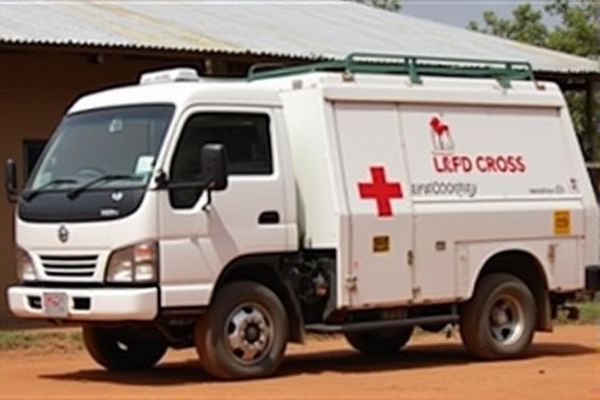
The Red Cross offers a variety of job opportunities in Zambia, focusing on humanitarian aid and community support. Positions range from health and social services to disaster management and logistics, appealing to professionals with diverse skill sets. Applicants can find roles such as project coordinators, health workers, and administrative staff, all contributing to the organization's vital mission. Involvement provides a chance to make a significant impact on local communities facing challenges like health crises and natural disasters.
Job Description
Red Cross jobs in Zambia encompass a range of roles focused on humanitarian aid, disaster response, and community health initiatives. Positions may include program management, health outreach coordinators, and emergency response specialists, all aimed at improving the well-being of vulnerable populations. Applicants often require skills in project management, data analysis, and strong communication to effectively engage with local communities and stakeholders. Opportunities to contribute to life-saving missions in various Zambian regions provide a chance for personal and professional growth in the humanitarian field.
Requirement
Red Cross job opportunities in Zambia require candidates to possess a commitment to humanitarian principles and a passion for community service. A relevant educational background or experience in fields such as health, disaster management, or social work is often essential. Strong communication and teamwork skills are also important, as candidates will collaborate with local communities to implement programs effectively. Familiarity with local languages and cultural competencies can enhance your chances of success in these roles.
Salary and Perks Expected
Red Cross jobs in Zambia offer a range of competitive salaries and valuable perks that reflect the organization's commitment to supporting local communities. Salaries vary depending on the position, with roles in healthcare, disaster response, and administration typically attracting higher compensation. Employees may also receive benefits such as health insurance, professional development opportunities, and paid time off, making these positions appealing for those looking to make an impact. Understanding these factors can help you better prepare for a rewarding career in humanitarian work within Zambia.
Similar Job Names
- Health Coordinator
- Emergency Response Manager
- Logistics Officer
- Field Medic
- Community Engagement Officer
- Disaster Risk Reduction Specialist
- Finance Officer
- Human Resources Assistant
- Administrative Support Staff
- Volunteer Coordinator
- Project Manager
- Monitoring and Evaluation Officer
- Project Officer
- Communications Officer
- IT Officer
Job Expectation Concept
Red Cross jobs in Zambia focus on humanitarian work, community support, and disaster response efforts. Roles often include health services, emergency preparedness, and vulnerability assessments, targeting various populations in need. Your adaptability and commitment to service are crucial, as these positions require collaboration with local communities and government organizations. Opportunities for professional growth and development are available, allowing you to enhance your skills in a meaningful way while making a positive impact.
Career Advantage and Weakness
Working with the Red Cross in Zambia offers the advantage of contributing to vital humanitarian efforts while gaining valuable experience in crisis management and community engagement. The organization often provides opportunities for professional development and networking, enhancing your career prospects in the humanitarian sector. However, potential weaknesses include the challenges associated with limited resources and funding, which can affect the scope and reach of projects. Additionally, exposure to high-pressure situations may require resilience and adaptability to navigate effectively.
Important Thing Must Know
Red Cross jobs in Zambia offer a range of opportunities for individuals passionate about humanitarian efforts and community service. Positions are available in fields such as health, disaster management, and community engagement, allowing you to make a meaningful impact. The organization prioritizes candidates with strong skills in communication, teamwork, and cultural sensitivity, essential for working in diverse environments. Networking and building relationships within local communities can enhance your chances of securing a role. Job vacancies are often published on the Red Cross website and through local job boards, making it important to stay informed about new opportunities.
Alternative Career Options
Exploring alternative career options related to Red Cross jobs in Zambia can lead to opportunities in humanitarian assistance, health services, and disaster management. Nonprofit organizations, government agencies, and international NGOs often seek professionals for roles in community development, emergency response, and public health education. Skills in project management, logistics, and social work are highly valued in these sectors, enabling you to make a significant impact. Pursuing certification or training programs in these areas can enhance your employability and broaden your career prospects in the humanitarian field.
Companies List
- Zambia Red Cross Society
- Ministry of Health Zambia
- World Health Organization (WHO) Zambia
- UNICEF Zambia
- Care Zambia
- Oxfam Zambia
- Medecins Sans Frontieres (Doctors Without Borders)
- Save the Children Zambia
- International Federation of Red Cross and Red Crescent Societies
- Zambia National Blood Transfusion Service
List of Ideal City
Lusaka, the capital city of Zambia, serves as a vital hub for humanitarian organizations, including the Red Cross, offering numerous job opportunities. Ndola, located in the Copperbelt region, is another key city where you can find positions related to disaster management and community health initiatives. Kitwe, also in the Copperbelt, plays a significant role in regional health services and often seeks professionals for various Red Cross-related programs. Living in these cities not only provides access to meaningful employment but also allows you to contribute to vital community support and development projects.
 zambia-jobs.com
zambia-jobs.com